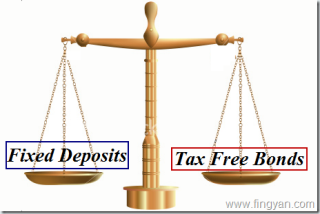At 11:30am today I was called by my Superior to his cabin. I had no idea why he was calling me; maybe he found out that I was the one who super-glued all his pens to his table. But when I went in, I was left surprised.
I stood there with my head down, trying to avoid making any kind of eye contact with him. “Well done” he said, while presenting me a big fat cheque as bonus for all the hard work I had done. I was startled as I obviously wasn’t expecting this to happen any time soon. “Use it well” he added, as I was leaving the room still amazed as to what had happened
“Use it well. Hmm… I wonder what I should do with it.” I asked myself while staring at the cheque. Maybe I should invest it, or maybe I should buy a new iPhone. I weighed my options and decided that it’s better if I invest it. But if I do invest it, what should I invest it in? Bonds? Fixed deposits? Shares?
“Bhai Tax free bonds main invest karle., Equity is too risky, Preference doesn’t ensure the same returns” my banker friend told me when I gave him this news. “Beta FD kara lo” my dad said when I asked him what is should be doing. Both of them were good options. Hence, I was confused when it came to choose between Fixed Deposits & Tax Free Bonds. So I sat down to note down the pros & cons of choosing either of the above two options in order to determine which of the above two instruments was a better for me. What was my conclusion? Let’s find out.
Let us break it down to definitions first.
Bonds refer to debt instruments, which are issued with the purpose of raising capital by borrowing. They usually carry a fixed coupon rate but their value moves inversely with interest rates. Accordingly, if interest rates decline, the value of a bond will rise and vice versa. Bonds are generally classified as taxable bonds and tax-free bonds.
Fixed deposits as most of us know are financial instruments provided by the Indian Banks, which provide investors with a high rate of interest than the usual savings bank account, until the given maturity date.
Let us look at some of the factors relevant while deciding whether to choose between fixed deposits or tax free bonds.
- Interest Rates: The first factor is obviously the amount of interest earned on the proposals. Fixed Deposits nowadays offer a rate about 6.8%- 9.25% as interest which is taxable at 10%/20%30% depending on the slab rate one is covered in. Thus giving us a net interest rate of 90/80/70 % of the above interest rate. However the interest earned on the bonds amount to 8.51%-9.01% (based on the bonds issued by HUDCO in 2013) post tax returns. Therefore, as determined, tax free bonds are more efficient than fixed deposits. They represent a good investment opportunity for investors in higher tax brackets.
- Ratings: Prior filing of prospectus the public sector companies are issued credit rating certificates determining the credit rates allotted to them by various agencies on their ability to handle debt. Well, most of the ratings provided to such institution fall between AAA to AA+ which leaves virtually no chance of default by such companies. Therefore, your investment is almost as safe as it should be if you invest in fixed deposits.
- Liquidity: If you do not wish to hold the investment till maturity, you can always sell the bonds in the secondary market and book profits. The liquidity of a bond depends on its trade volumes after listing. However, to be on the safe side, you should give preference to companies that are planning to list on both the BSE and the NSE. Fixed deposits can be withdrawn at any time, however, this might lead to a penalty since you might lose valuable amount of interest due to premature closure of fixed deposit.
- Limit: One cannot invest more than 1 lakh (including PPF) in order to avoid taxation on the same since the limit of Section 80C cannot be more than one lakh during a year. However there is no such limit on Bonds.
- Scope of Capital Appreciation: We all know India is struggling with a high inflation rate and the interest rates have been ruling on a higher side. But, as the economic growth is falling, there is a strong possibility that RBI will soon start cutting interest rates in its forthcoming monetary policies. Whenever the interest rates come down, bond prices go up. In that scenario, there is no scope for FDs to result in any capital appreciation as FDs are not tradable and you cannot transfer the ownership of your FDs to anybody else in the market. At the same time, there is a scope of capital appreciation with tax-free bonds as and when the inflation and interest rates fall. These bonds are tradable and freely transferable to any of the interested buyer on the exchanges where these bonds are listed.
All things considered, bonds offer a great investment proposal. However, your investment choice should be based on your cash-flow requirements and the tax bracket into which you fall.


































